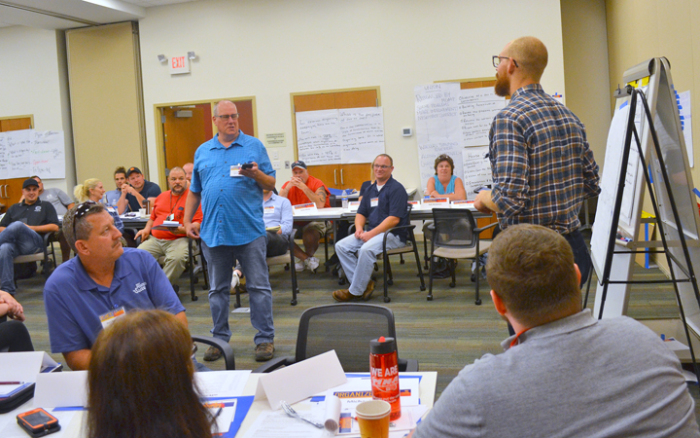

Share
It takes a strong union to bargain a strong contract. Or, as CWA Local 7304 member Jim Wiebe put it: “A hammer doesn’t swing by itself.”
A union steward and welder at the New Flyer bus facility in St. Cloud, Wiebe was one of 55 activists from across the Midwest who traveled to St. Paul last week for the AFL-CIO Organizing Institute, a three-day boot camp in building stronger unions.
It convened less than two weeks after the Supreme Court sided with corporate interests in Janus v. AFSCME, a decision making it harder for public-sector workers to join together and bargain strong contracts.
Janus may be a setback for labor, but activists at the training sounded ready to push back, building power from the inside out.
“Too many of our members, they think that the stewards or the reps are the union,” said Andrea Branson, a HealthPartners billing representative and steward for Office and Professional Employees Local 12. “No, they are the union, but a lot of people don’t recognize that.”
Janus makes “right-to-work” (RTW) the law of the land in public-sector workplaces, allowing workers to reap the benefits of a union contract without sharing in the costs. Under RTW, unions must convince as many workers as possible to resist the temptation of “free-riding” and, instead, sign up for membership.
At the Organizing Institute, activists picked up tips for engaging fellow workers in conversations about supporting their union. Chris Tucker, president of Machinists Local 1010 in right-to-work Iowa, called it one of the most important conversations some people will ever have.
“When you talk to someone who doesn’t have a union, it can be a life changing experience for them,” Tucker said. “They can figure out there’s a better life by bonding together with their fellow workers.”
Even in states like Minnesota without a RTW law on the books (yet), private-sector unions have seen one-on-one conversations build the foundation of successful contract campaigns.
Wiebe’s St. Cloud-based local includes some 600 members of the Communications Workers of America. (“It’s a big unit to mobilize,” he deadpanned.) But as talks with New Flyer reached a tipping point last year, the local staged a rally that drew a third of its members. It was the largest event in Local 7304’s history, Wiebe said – and the result of scores of conversations on the shop floor, in the break room and outside the plant gate.
“New Flyer came to the table after that action, and it looked like they’d lost their best friend,” Wiebe said. What’s more, the company improved its offer on the table to include double-time pay for workers logging overtime on weekends.
Bonnie Jolly, a union steward at the Pearson’s Candy plant in St. Paul, hopes for a similar outcome this fall when Bakers Local 22 enters contract negotiations with the company. She’s already making sure as many members as possible on her shift are tuned into the process.
“We’re going for wages and better benefits,” Jolly said. “Whenever I go on break, I try to talk one-on-one with somebody I work with. I tell them if you don’t get involved now, you have no right to complain after the contract is done.”
In RTW states, though, the work of engaging co-workers doesn’t start when negotiations show up on the calendar. It’s part of a constant campaign to keep the union afloat.
Duluth resident Keith Musolf, a member and organizer for Ironworkers Local 512, represents people in Wisconsin and North Dakota, both RTW states where Ironworkers can opt out of paying dues while working on union job sites.
“You don’t have to drive very far to see a large change,” he said. “We’re so secure in our island of Minnesota, and they’re on their own race to the bottom. Traveling there is just an attitude check for me.”
Indeed, many labor experts now believe RTW will be the law of the land in the near future, whether by legislative action or court decision. (Janus-style cases targeting private-sector workplaces are already in the works.)
But the outcome isn’t necessarily gloomy, Branson said. She befriended several workers from RTW states at the Organizing Institute.
“I’m listening and hearing that a lot of unions in these states got stronger,” Branson said. “They say members have a better sense of what’s at stake. They are the union, they know what it’s about and they haven’t let (RTW) discourage them. I think that is so cool.”
In the end, Wiebe said, every conversation in an organizing drive comes down to the same question, and it’s one public-sector workers in Minnesota and across the country are presently answering for themselves.
“Would you rather try going in and bargaining by yourself, or go in and bargain as a bunch?” Wiebe said. “We’ve got to get people to understand that there’s power in numbers.”

